Data Hypothesis testing: Is the mood higher on paydays? No, and yes
Today we’re doing some hypothesis testing:
Hypothesis testing: Is the daily mood higher on paydays? [Manufacturing]
Fact:
- The Mexican subsidy of Lohmann-Koester measures employee engagement on a daily basis.
Hypothesis testing:
- Their manufacturing workers get paid every Tuesday. Is employee engagement higher that day?
Today we’ll be doing some hypothesis testing!
To summarize, the General Manager at Lohmann-Koester had formed a hypothesis around payments that he wanted to check.
Dirk Feldhaus, who’s transparent leadership we have previously written about, runs a manufacturing facility.
The majority of their workers get paid on a weekly basis.
So the leader felt that theoretically on Tuesdays when they get paid, the employee mood should be higher.
This was interesting for us at Celpax too.
Particularly since we have many blue-collar work environments that report a higher percentage of green feedback on the day they receive their salary.
Many of these get paid on a monthly basis though.
And VERY few of them have such a high employee mood KPI as Lohmann-Koester has.
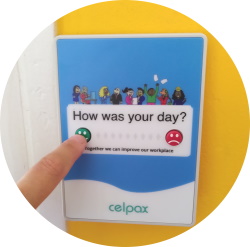
Hypothesis testing: Does pay-day mean greener Tuesdays?
Originally founded as a subsidiary to support sales activities in America, Lohmann-Koester Mexico has been developing adhesive closure systems for baby diapers and incontinence briefs since 2006.
The company started measuring employee morale on a daily basis at the beginning of 2017.
Workers simply press green or red as they leave work as the shift ends.
Subsequently, the manufacturing employees over at Lohmann-Koester have told their colleagues – and managers - how they feel about their workdays 83.600 times.
That’s a lot of data points.
Who said Mondays are blue? Not the Lohmann-Koester workers
We started by looking at the differences in the daily mood chart.
First, we looked at the data from the last 30 days.
Are Tuesdays greener than the other days of the week?
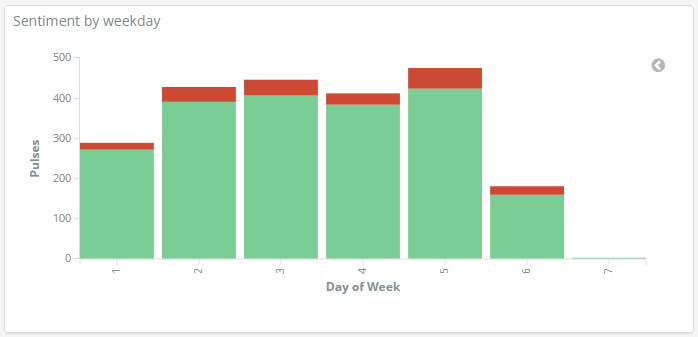
Data from the last 30 days
Nope. There isn’t much difference between the workdays.
Actually, Monday was the day that most people chose to press the green button instead of the red.
Perhaps we need to expand the time frame to get more data points into our hypothesis testing.
What about the last quarter?
Would it back the hypothesis that employees press more green smileys as they get paid on Tuesdays?
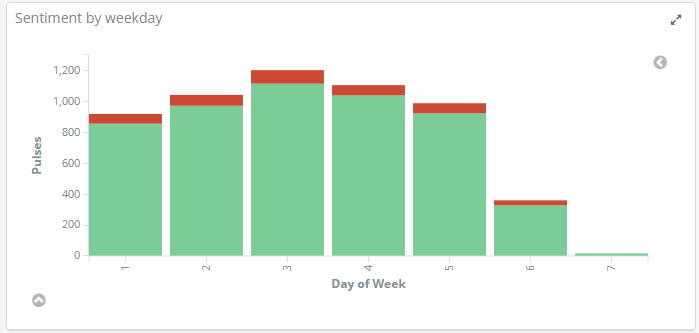
Hypothesis testing: Employee mood data from the last 90 days
Nope, that’s another negative.
Likewise, when we expanded the daily mood chart to show the last quarter, last year, all-time data, etc, that didn’t change the findings either.
The employee mood is not higher on their pay-day.
In fact, when we took the combined data from the 1350 days they’ve been measuring, Mondays continued to be their happiest day by 5 points to the day with the lowest result (Thursdays).
And hey, do you see the results for Saturdays?
They have a limited number of people on their weekend shift. However, staff satisfaction on Saturdays is only one point behind Mondays!
Hypothesis conclusion
In this case study with Lohmann-Koester, there is no data evidence that the weekly payday equals a higher employee mood.
To summarize, getting their pay-check every Tuesday, doesn’t make Tuesdays happier than other workdays.
Later on, we will continue with more hypothesis testing examples.
We do have many blue-collar worksites that have verified a higher mood % on paydays. So with monthly wages, there might be a bigger difference.
And when the baseline mood is lower at a worksite, perhaps paydays play a bigger role.
Lastly, in comparison to other manufacturing sites, Lohmann-Koester has really nailed employee engagement at this site.
Congrats!
What hypothesis do you have around employee morale?
Start measuring with a Celpax device and we can do some hypothesis testing together.
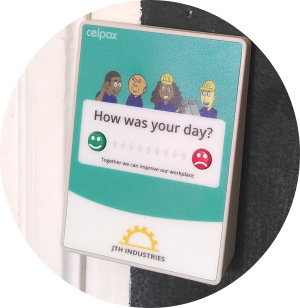
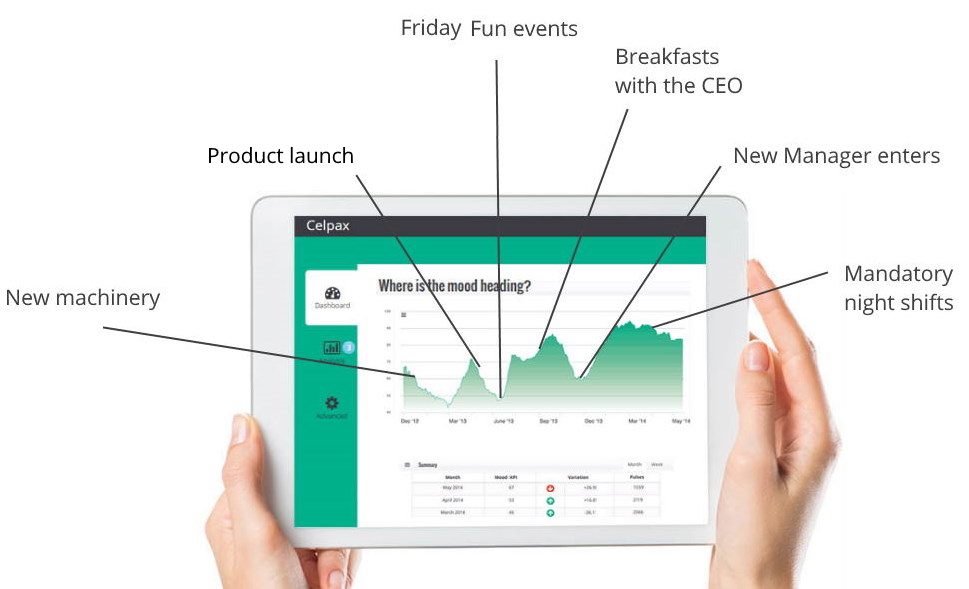
 Hej! I’m Rebecca, co-founder at Celpax. We use simple tech tools to create better work environments. And build a better society while at it! Join me on Twitter to talk more about hypothesis testing. And hey, follow us on Linkedin.
Hej! I’m Rebecca, co-founder at Celpax. We use simple tech tools to create better work environments. And build a better society while at it! Join me on Twitter to talk more about hypothesis testing. And hey, follow us on Linkedin.
Similar interests
- Non Gamstop Casinos UK
- Slot Sites UK
- New Betting Sites UK
- Casinos Not On Gamstop
- Gambling Sites Not On Gamstop
- Casino Non Aams Sicuri
- UK Online Casinos Not On Gamstop
- Gambling Sites Not On Gamstop
- Sites Not On Gamstop
- Sites Not On Gamstop
- Non Gamstop Casino Sites UK
- Best Online Casino Canada
- UK Casino Not On Gamstop
- Non Gamstop Casinos
- Casinos Not On Gamstop
- Siti Scommesse
- Top Casino Sites UK
- Slots Not On Gamstop
- Casino En Ligne Meilleur Site
- Casinos Not On Gamstop
- Betting Sites UK
- Slots Not On Gamstop
- UK Casino Not On Gamstop
- Migliori Casino Online Non Aams
- Non Gamstop Casino UK
- Lista Casino Online Non Aams
- Meilleur Casino En Ligne
- Best Crypto Casino
- Casino En Ligne
- Casino Online
- Casino En Ligne France
- Paris Sportif Ufc
- Casino Jeux En Ligne
- Meilleur Casino En Ligne
- Bonus Free Spin Senza Deposito
- Casinò Non Aams Con Free Spin Senza Deposito
- Nuovi Casino Non Aams
- Migliori Casino Online
- Crypto Casino
- Casino Non Aams



